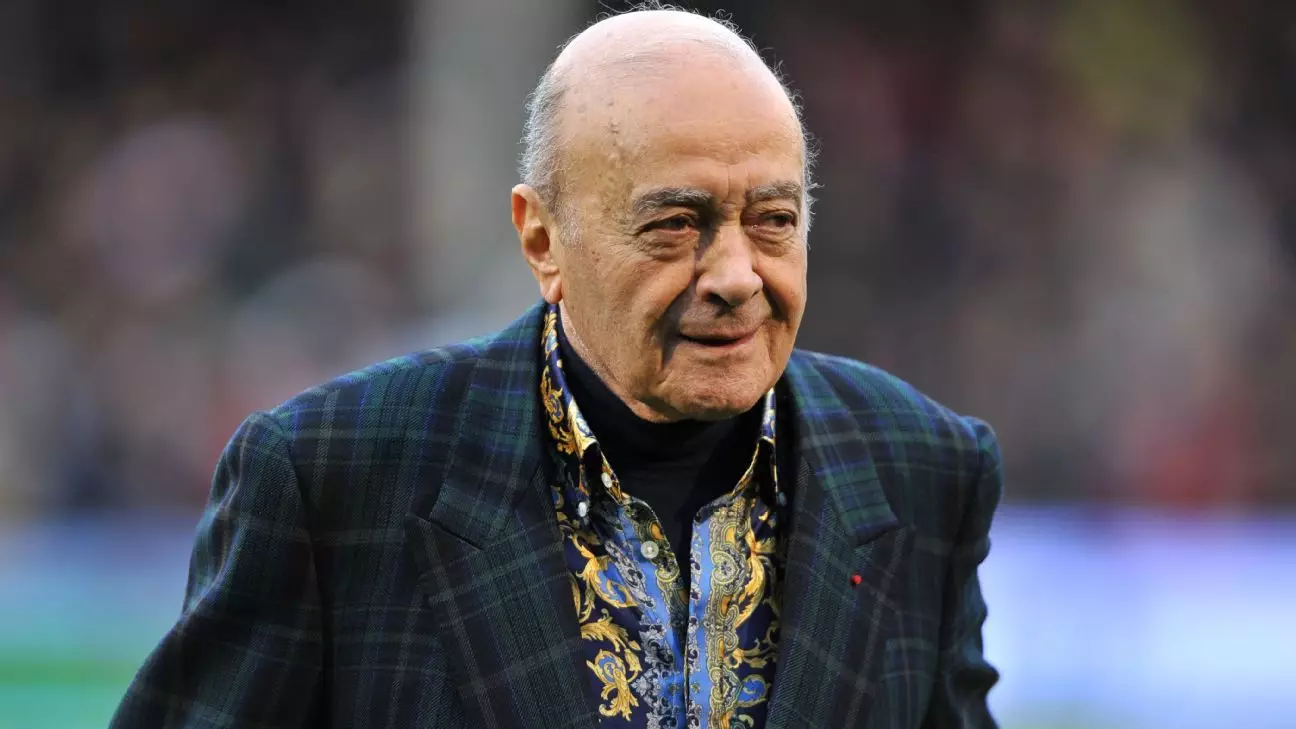The world of football is frequently mired in controversy, but allegations arising from the dark legacy of former Fulham FC owner Mohamed Al Fayed have ignited new discussions about accountability and systemic abuse. Following the release of a BBC documentary titled “Al-Fayed: Predator At Harrods,” serious accusations have come to light regarding Al Fayed’s alleged sexual misconduct involving multiple victims. This has prompted the Premier League club, Fulham FC, to investigate if any individuals connected with the club have been affected, highlighting the broader implications of the accusations and questioning the oversight in powerful circles.
Fulham FC released a statement expressing their deep concern regarding the allegations against Al Fayed, who was the club’s owner from 1997 until 2013. The club has announced it is actively investigating whether any current or former members have been victims of his purported actions. “We are deeply troubled and concerned to learn of the disturbing reports following yesterday’s documentary,” the club stated, sympathizing with those affected and encouraging individuals to come forward with their experiences. This begs the question of how clubs manage the legacies of former owners, especially when those legacies become blemished with criminal accusations.
Prominent among the accusations is a chorus of voices represented by attorneys alleging that Al Fayed engaged in abusive behaviors over a 25-year period along with the operations of Harrods, the luxury department store he famously owned. A legal team publicly disclosed that they are representing dozens of women, painting Al Fayed as a “monster” who exploited his position of power—a portrayal that resonates within historical contexts of abuse by influential figures, drawing parallels with high-profile cases like those of Harvey Weinstein and Jeffrey Epstein.
During a press conference led by attorney Dean Armstrong, the systemic enablement of Al Fayed’s behavior came into sharp focus. Describing the atmosphere at Harrods as one that allowed such actions to thrive, Armstrong emphasized the need for organizations to acknowledge their historical complicity in fostering environments where such abuses could proliferate without consequence. The revelations challenge organizations, like Fulham FC, to critically assess their own histories and the influence of their former owners.
Among those sharing their harrowing experiences is a woman identified only as Natacha, who alleged that Al Fayed manipulated vulnerable individuals for his pleasure. Her account details a terrifying encounter that took place when she was a young personal assistant. The recollections converge around a theme of fear, manipulation, and absence of support—a grim reality for those in similar predicaments who feel compelled to remain silent due to the power dynamics at play. The chilling nature of her story raises important considerations about protection and safeguarding young employees in various industries.
Despite the alarming accusations and the ongoing investigations, the question remains: how thoroughly do institutions investigate claims of abuse? The Metropolitan Police were mentioned to have been previously alerted to allegations against Al Fayed, but it appears there were significant lapses in pursuing these matters legally. As the culture surrounding sexual abuse cases continues to evolve, it becomes crucial to discern whether enough is being done by relevant authorities to uphold justice.
Much of the responsibility also falls on the organizations that perpetuate such enabling cultures. The owners of Harrods, now separate from Al Fayed’s management, expressed shock at the allegations but were criticized for claiming ignorance of the situation during their tenure with Al Fayed. Armstrong contends that continued denial of awareness does little to absolve culpability and adds a layer of complicity to their legacy.
The accusations against Mohamed Al Fayed have catalyzed renewed discussions about accountability, especially within the context of sport and high-profile establishments. Fulham FC’s investigation may serve as a critical moment for prioritizing the voices of victims and demonstrating proactive measures in safeguarding individuals from abuses of power. As society progresses towards greater understanding and action against sexual abuse, institutions connected to such figures must engage in authentic self-reflection and transparency, ensuring that history does not repeat itself. The true measure of progress will be how these revelations prompt not only investigations but lasting change within cultural frameworks that allow such predatory behavior to persist unchecked.

